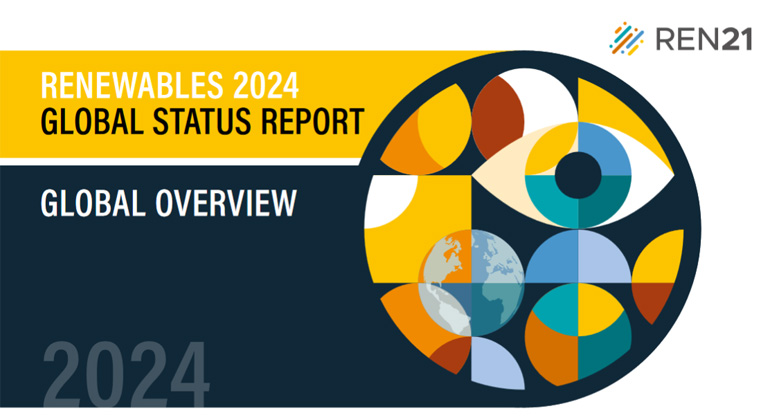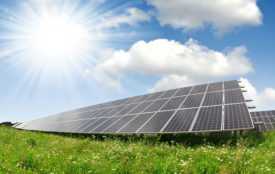Global Renewable Status Report 2024: Financing is a bottleneck in the energy transition
A lack of measures, financing and infrastructure is hampering the transition from fossil fuels to renewable energies, as the Global Renewable Status Report shows.
Policy responses to geopolitical developments and global commitments accelerated the
deployment and use of renewable energy in 2023, especially in the power sector. The historic decision
at the 2023 United Nations Climate Change Conference (COP28) to triple renewable energy capacity
and double annual energy efficiency improvements by 2030 further raised ambition and built
momentum for renewables. Growing leadership and appetite for renewables in developing countries
is clear, but finance remains a major obstacle. Renewables are increasing in the overall energy mix, but
they are not replacing coal, oil and gas at the required pace for various reasons: the overall demand for
energy is rising fast, renewable energy projects are significantly more expensive in developing countries
and large bottlenecks persist in permitting, infrastructure and connecting renewables to grids.
This is the main message of the Global Overview of the Renewables 2024 Global Status Report (GSR
2024), released today. As the first module in a series to be released during the year, the Global
Overview provides the big picture status of renewables in the wider energy system and in the context
of global challenges such as climate change, economic development and the geopolitical landscape.
REN21 has been tracking renewable energy targets, policies and progress since 2005. Last year, REN21 began releasing the GSR as a collection of distinct modules to enhance understanding of the different aspects of the energy system, including demand; supply; systems and infrastructure; and economic and social value creation.
“The world is burning more fossil fuels than ever before, global energy-related emissions are increasing,
and ever-growing energy demand is not being fully met by renewables. This is aggravating the climate
crisis and derailing the energy transition. We are missing the opportunity to build resilient and inclusive
societies by fully deploying the economic opportunities that renewables provide,” said REN21 Executive
Director Rana Adib. “We must also make rapid gains in energy efficiency to make best use of the energy
we consume,” she added.
Renewable energy use surged 58% between 2012 and 2022, but overall energy demand also grew 16%
during this period. The increase in demand has been met mostly by coal, oil, and fossil gas, which
together accounted for around 65% of energy consumption growth between 2012 and 2022.
Policy responses to curb energy insecurity and inflation have proven effective in reshaping the
renewable energy landscape and boosting renewables investments and projects. The US Inflation
Reduction Act and the RePowerEU plan have diversified supply chains, taking the first steps towards
reduced reliance on a handful of manufacturing countries and greater energy independence.
COP28 was a historic win for renewable energy, creating unprecedented momentum and driving higher
ambition. Developing countries are stepping up. The Latin America and Caribbean Renewables Hub, for
example, raised its 2030 target for the share of renewables in the region’s total electricity generation
from 70% to 80%. The region also aims for 36% renewables in its total energy supply.
“The COP28 decision was a big win but would have been even bigger if it targeted the entire energy
system, and not just the electricity system. It also missed an opportunity to highlight finance as a
foundational ingredient for its success. There is a critical and urgent need for a complete system-wide
and sufficiently funded shift to renewable energy, to create just, equitable, resilient and prosperous
societies and economies,” Senior Officer at Climate Action Network International (CAN) Janet Milongo
said.
The GSR 2024 Global Overview shows that despite improvements, the gap between current and
required renewable energy investments is still significant. Global investment in renewable power and
fuels increased 8.1% in 2023 to reach around USD 623 billion. However, BloombergNEF and the
International Renewable Energy Agency estimate that USD 1,300 to 1,350 billion are needed annually
to achieve the goals set at COP 28 and in the 2015 Paris Agreement.
The global financial landscape continues to put low-income countries at a significant disadvantage, with
the cost of capital for renewable energy projects reaching as high as 10%, compared with less than 4%
in high-income countries. Instead of supporting developing countries’ efforts to leapfrog fossil fuels and
establish renewables-based economies, this situation exacerbates inequality and prevents these
countries from benefitting from the huge opportunities presented by renewables – not only to address
energy access, but also to drive economic and industrial development.
This report underscores the structural issues impeding the pipeline of renewable energy projects
globally. Worldwide, an estimated 3,000 GW of renewable energy projects remained underdeveloped
as of 2023 due to inadequate grid infrastructure, insufficient financing, and permitting delays. These
are major bottlenecks that risk derailing the energy transition.
“Electricity grids have been ignored far too long. Their enabling role to integrate renewable energy
sources needs to be acknowledged in every country. We need to remove bottlenecks to electricity grid
deployment. Building grids in harmony with nature and with people’s support is completely possible.
We at the Renewables-Grid Initiative (RGI) demonstrate this continuously through our activities,” said
RGI Chief Executive Officer Antonella Battaglini.
“Renewable energy is our best bet for quick energy generation that unlocks concrete social and
economic benefits and boosts support for this technology. But lack of access to finance and high capital
costs are penalising developing countries and preventing millions of people from achieving social and
economic progress. The COP28 decision is not enough – it must be reflected in our actions. We must
refocus our energy planning to place renewables at the centre. We must be more ambitious, build
stronger policies, and ensure an equitable distribution of financial investments, technology and skill
sharing to ensure a rapid global energy transition that puts people first,” said Adib.









